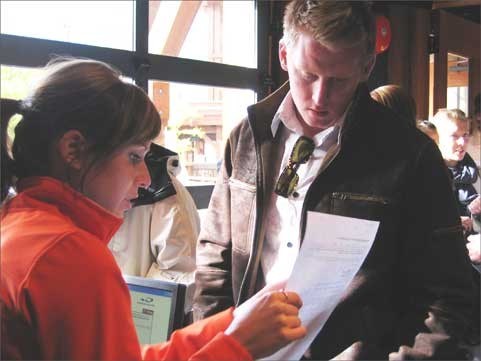By Andrew Mitchell
The good news is that Whistler-Blackcomb should have no problem
meeting staffing requirements this winter. The bad news is that employee
experience director Kirby Brown doesn’t think the company, or Whistler, is out
of the woods just yet.
“Things are cooking,” said Brown, “but the story is that we
went heavily overseas and across Canada to recruit and really simplified the
process, and we’re coming after a really good snow year. We’ve managed to buck
the trend to a certain extent this year, but we have no confidence moving
forward that we’ll be able to attain that next year or the year after unless we
continue to be fairly aggressive.”
The trend in Whistler and throughout Canada is a severe
shortage of workers, both as a result of economic growth in resource industries
and manufacturing and of demographics — baby boomers are working less,
and many are already retired.
Whistler-Blackcomb held its annual job fair from Monday to
Wednesday this week, interviewing 1,700 applicants. Whistler-Blackcomb also has
about 450 pre-hires from recruiting efforts in places like Ontario, Australia
and New Zealand, most of whom are expected to turn up to work.
In total Whistler-Blackcomb needs about 1,200 seasonal
employees this year, who will join the year-round staff of roughly 1,000
employees. Having a solid turnout to the job fair is ideal, says Brown, because
it gives the company some choice in the people they hire and a variety of
skilled and unskilled work experience to draw on.
By way of comparison, Whistler-Blackcomb had 2,200 people turn
up for the job fair two seasons ago, and just 1,400 last year.
Brown says Whistler-Blackcomb has become a lot more aggressive
in its recruiting efforts.
“The reality is that recruiting is not rocket science, you have
to find out where the people are that can work here and go get them,” said
Brown.
“We’re working closely with our partners within the community
and outside the community to find new employee marketplaces for Whistler, such
as places like Europe and South America.
“Of course a lot of that is dependent on how Canada issues work
visas, which we’re hoping will become a lot more open to allow us to position
Whistler in foreign markets.
“That’s not something we can count on happening overnight,
which is why we’re also working with Mount Currie and Squamish nations, and to
see how we can be a more attractive employer locally and across Canada. It’s all
about long-term strategies — even if we have a great season again and
numbers are great next year as well, in three to five years it might not be the
same situation.”
One of the long-term strategies is a program where
Whistler-Blackcomb visits high schools across the Lower Mainland, hosting a
course on writing resumes. “It’s a way to get Whistler-Blackcomb into those
schools as an idea of somewhere they might want to work,” said Brown.
As well, Whistler-Blackcomb is looking at ways to recruit
members of Vancouver’s growing Asian and immigrant community, both as customers
and potential employees. Like the high school program, Brown says this will
take several years to be successful.
The Whistler Employment Centre is hosting a job fair for other
Whistler businesses from 9 a.m. to 5 p.m. on Oct. 31 and Nov. 1.
The Whistler Chamber of Commerce believes Whistler needs to recruit at least 4,000 workers a year heading into the 2010 Games. Those projections are backed by a regional survey of employers by Go2, the human resources arm of the provincial tourism industry.




